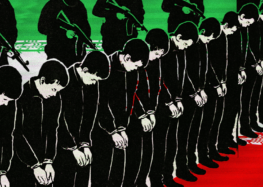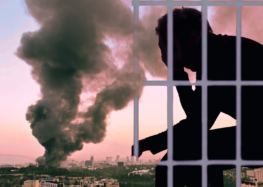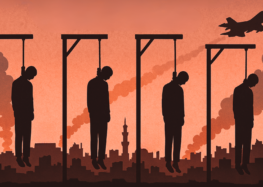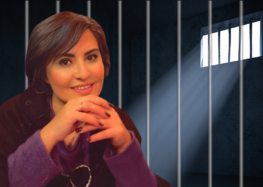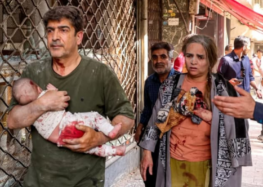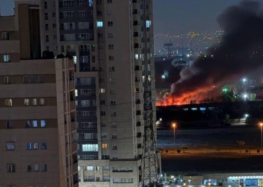Dissident Cleric Tortured and Prosecuted: “They Told Me ‘We Will Snatch Your Wife”’

Arash Honarvar Shojayee granted an exclusive interview to the Campaign a few hours before he returned to prison.
Arash Honarvar Shojayee, a dissident blogger and cleric, returned to Evin Prison on Saturday, June 30, after his furlough leave ended. Hours before returning to prison, in an interview with the International Campaign for Human Rights in Iran, he said that he will be put on trial on new charges of “propagating falsehoods with the intent to create public anxiety” on July 11.
He told the Campaign during this interview that during his interrogations he developed epilepsy after he was severely beaten. He also provided details about his arrest and his charges, as well as the glaring shortcomings of his trial process.
He told the Campaign:
“Two days after my arrest, they arrested my wife, too. In order to arrest my wife, they had raided her father’s house. My father-in-law never recovered from the shock of these actions and his daughter’s arrest; a short while later he had a heart attack and died. They kept my wife in solitary confinement for four days. Everyday they brought her to my interrogation sessions as a way to threaten me. They told me, ‘we will snatch your wife from you.’ They told me that they had arrested my brother. All these news and the fact that I was not allowed to contact my family for eight whole months, it was very hard. They put handcuffs and footcuffs on me and they would attach them together; then they would keep me for long periods of time during the coldest nights of the winter in the fresh air area of Ward 209 at Evin. I received a blow to my head that led to my developing epilepsy as is evident in my medical records. I was threatened numerous times that if I didn’t confess, I would be executed. They said, ‘we will hang you ourselves,'” said Arash Honarvar Shojayee about how he and his family were treated following his October 2010 arrest by security forces.”
Shojayee told the Campaign:
“I was arrested on October 28, 2010. I was sentenced to 4 years in prison, 50 lashes, and $800 in cash fines, and lifetime defrocking as a cleric on charges of ‘espionage,’ ‘propagating against the regime,’ ‘acting against national security,’ and ‘disrespecting the clergy. I spent five months in a solitary cell inside Evin Prison’s Ward 209, and another three months inside a two-person cell. Later I was transferred to the General Ward 350 until my ruling was issued. Beginning on October 5, 2011, I was transferred to the Special Clerics Ward. I received a medical furlough to seek treatment for my ailments and I gave an interview with Kaleme Website about how I was treated during my detention, as well as answering questions about statements made against me in the newspapers. I also wrote an open letter, criticizing the Special Court for Clergy. After these my furlough was not extended and I returned to prison. But when I returned to prison, I protested having to return while my medical treatment was incomplete, so I stepped on a wet hunger strike for nine days. I have a heart condition and epilepsy and according to a Medical Examiner’s letter, I had to undergo further treatment and more tests, but they returned me to prison half-way through my treatment. On the ninth day of my hunger strike, Hojjat-ol-Islam Montazeri, who was head of the Administrative Justice Courts at the time, came to visit me as a representative from Mr. Khamenei. He said that my hunger strike was an excuse for foreign media propaganda. He said no clergy has ever gone on a hunger strike. He insisted that I end the hunger strike and promised that in less than 15 days I would be given medical furlough again. I ended my hunger strike and he gave me medical leave, on the condition that I would not interview with the media. On May 4, there was talk about a general pardon and Mr. Ghadyani, the Prosecutor at the Tehran Special Court for the Clergy said that he would put my name on the pardon list and the Judge in my case also agreed with the pardon. It appeared that my pardon was final, but in the end, against the common process of Special Court for the Clergy, the pardon did not apply to me. The reason I say this was against the common process is that according to the process, if someone does not have a plaintiff and there is no monetary claim, he could qualify for a degree of pardon, for example 1/3 of their prison sentence, or their flogging or cash fines could be eliminated through the pardon. But none of these applied to me.”
Arash Honarvar Shojayee provided the Campaign with details of what he called “psychological and physical pressure” during his detention:
“On October 28, 2010, I was at home with my mother. The two of us were not in a good psychological state because my father had just passed away. All of a sudden, two armed forces, along with several other forces, broke down the door to our house and entered. They made my mother lie down on the floor and they pointed a rifle at her. Before I could make a move, they beat me and threw me to the ground. My ribs broke as a result of their blows. They then blindfolded us and searched our home until midnight. They confiscated all the things I had written for the past 15 years. They took a lot of items with them, items that belonged to the family and were not related to my charges, such as family albums. They arrested my wife two days after me. They put pressure on me for television interviews. They wanted to call the broadcast “Confessions of A God-less Arash.” In a completely illegal move, prior to holding my trial court, they stated on IRIB that I was a spy and a seditionist fake cleric. They asked on Kayhan Newspaper whether I was really a cleric. During my furlough leave, in order to prove that I was a cleric I published the hand writings of 25 Grand Ayatollah’s who had confirmed me during the years. I went to visit them and took photographs with them. I put the photographs on RASA website, which belongs to the traditional clerics,” he said. “I will have a new court trial on July 11 on charges of “propagating falsehoods.” Their evidence for this charge is my interview with Kaleme Website. I view this new trial as completely illegal, because according to the law, they must first review whether what I said was the truth or not, and [if not,] then try me on charges of “propagating falsehoods.” What I said is the absolute truth. I spoke in my interview about how the forces attacked my home, how I was interrogated, and how I was put under pressure. Therefore, according to Article 727 of Islamic Penal Code, this is one of the crimes that needs a plaintiff, and I don’t have a plaintiff. They also did not allow me to choose a lawyer. Therefore I consider this court as illegal and I am sure that it will convict me just like the other court did.”
The cleric blogger told the Campaign that he never accepted the charges waged against him. “During my very long interrogation phase I was under a lot of pressure. There was pressure on me to accept the charges of espionage and cooperating with anti-religion websites and to accept that I wrote internet content under the name of Godless Arash,” he said. Asked whether he had written any letters to the authorities to request a retrial, he said, “I didn’t do this because I thought that if I maintained silence for a while, the circumstances might change. But when I was not granted a pardon and they set up a new trial for me, I felt that their stance against me has become harsher. They even disrupted my medical treatment. The Special Court for the Clergy took my original letters from the Medical Examiner, which ordered my hospitalization, so that they may make some photocopies of them and attach them to my case. But they never returned them.” The Campaign asked Arash Honarvar Shojayee based on what evidence the charges of espionage were raised against him in the case. “I grew up in Germany until I was 11 years old. Apparently, their issue was why would someone who grew up in Germany and who does not belong to a religious family, want to become a Seminary student. I also translated German texts. They accused me of promoting the German culture and literature, but what I was doing was purely cultural. I taught German at Goethe Institute from 2001 until 2004. Of course I had no problems at the time that I was doing these things, and I even worked as an IRIB anchor, too. But after my return, everything I did was seen as espionage and they tried to show that my presence at the Seminary had come as a result of orders by Germans to collect information for them and to infiltrate the clerical community through me.” He added:
“Maybe one of the reasons was that I entered the Seminary when I was very young and I became a Mujtahid (source of emulation) very quickly. The Grand Ayatollahs represent different social spectra of revolutionary, dissident, and critical-of-the-government ways of thinking. I interacted with the whole spectrum and knew a lot about each of them. Until I was arrested, I reflected the thinking and writing of Grand Ayatollahs who thought differently and criticized the concept of Velayat-e Faghih (Supreme Jurist/Leader) and actions of Ayatollah Khomeini in my blogs, “Yad-daasht ha va bardaasht ha” (Notes and Perceptions). In my blogs, the concept of Velayat-e Faghigh has been frequently critiqued, not politically, but theologically. And now it’s funny that they would use all of this to charge me with ‘propagating against the regime through weakening Velayat-e Faghih,’ because it is a Seminary student’s job to critique and express his opinions. It was my right as a student to reflect my findings, so that others could point out its deficiencies. The other thing is that a book I wrote about the life and thinking of deceased Grand Ayatollah Shariatmadari caused a lot of sensitivity…I also defended Grand Ayatollah’s under house arrest, such as Seyed Mohammad Shirazi, Seyed Hassan Ghomi, Seyed Sadegh Rohani, and other dissident Grand Ayatollahs. I also oppose the state’s interference in the Seminary affairs. Along with some other students, I boycotted the Qom Seminary Management Council examinations. When the Council was set up, the traditional Grand Ayatollahs believed that it was meant for the rulers to interfere in the affairs of the Seminary. In his statements about this Council in 1995, Ayatollah Khamenei said that the goal was that all Seminary students had to be tested through the Council examination, and that if the Council did not select them, they could not be students. During these years, students like me, who favored the Seminary’s independence, have boycotted the Council examinations. To summarize, because they couldn’t state that a cleric and teacher of the Seminary has been arrested for his critique of the Velayat-e Faghih concept and his support of critical Grand Ayatollahs, they leveled such charges against me.”
In fact, if a Seminary student does not participate in the Council examinations, he cannot receive his diploma, but according to Arash Honarvar Shojayee, he can take the traditional route to the point where the Grand Ayatollah’s would confirm him. “[Once confirmed,] you will be confirmed by all other clerics. That is how it was for me. I didn’t have a diploma, and I was not using government funds during my Seminary studies. But after I became a Mujtahid, my teacher requested permission for me to wear the cleric frock,” he said. The dissident cleric blogger told the Campaign that he believes the Special Court for the Clergy to be illegal. “See, the Clerics Court was formed based only on a procedures manual. According to Articles 159 and 172 of the Iranian Constitution, the the courts of justice are the only official bodies to which all grievances and complaints are to be referred, and Special Military Courts only attend to special crimes committed by military personnel. Also, according to Article 173 of the Constitution, the Administrative Justice Court is also authorized to review the people’s grievances. The legislator only recognizes these three bodies as qualified for review of cases according to the law and does not recognize other bodies as legal. Therefore, the Revolutionary Court and the Special Court for the Clergy are fundamentally illegal and their rulings are not legal. This is why I do not recognize my court and its ruling as valid. Especially where it pertains to the defrocking ruling handed to me. This issue is related to the clerics and the Grand Ayatollahs and is a clear example of the interference of the rulers in the affairs of the Seminary and the clerics. When I was served with my sentence, I told them that you did not frock me to defrock me now, the Grand Ayatollah’s frocked me.”

